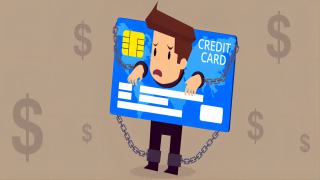What do you Know About Credit Scores!
Insuring Your Peace of Mind: An Overview of Common Types of Insurance.
What to do When Your Auto Insurance Claim is Denied?
Unveiling the Truth: Debunking Home Insurance Myths.
About Balance Transfer Basics!
What You Need to Know About Secured Credit Card Deposits!




If you are trying too hard to manage your finances or save money but keep failing to do so, here are 10 realistic money management tips for you.
Most money management strategies such as bare bones budget require a very high level of patience and discipline. If you are young and carefree, and already finding it hard to save money, you need an approach that is tailored for you, by you.
1.Don’t get a credit card if you are not responsible enough: Stick to cash or debit
Finance gurus keep bugging everyone to get a credit card and start building a credit score. But credit cards can become a nightmare if you fail to make timely payments.
As per a report by Fox Business, around 35% of credit card holders in the U.S have admitted having maxed out their credit card at least once in recent years. Maxing out credit card leads to low credit score.
Delaying or missing credit card payments means accumulating interest on them. If you are not ready to take the responsibility of using the credit card properly, it’s best to stick to a debit card.

2.Pay bills on time
The first step of budgeting is to pay immediate and important bills and expenses on time. Let’s say you usually get your paycheck in the first week of the month and your rent is due by 15.
Pay the rent and bills right away so that you’ll be left with what you have to spend on other items. Paying the most important bills first allows you to spend the rest of your money with no fear of overspending.
3.Create a monthly budget and track your spending
The two common tips you’ll find in personal finance books are: don’t spend more than you earn and track where your hard-earned money is going. Create a monthly budget and stick to it. At the end of the month, check where your money went by looking at your bank history.
You’ll find areas where you can limit spending. A simple purchase of a coffee machine instead of buying expensive coffee every morning can help you save up to two thousand dollars a year.
4.Frugal living is not for everyone
If you are trying to save money, you’ll feel enticed to live frugally and not spend money on anything at all. This can be a huge mistake. Living frugally means no dining out, not going to the movies with friends, and not buying that gorgeous pair of shoes you have been eyeing for the last 3 days. All of this is hard!
Adopting a 50-30-20 is a better option. Where you budget and spend 50% of your income towards necessities or needs, 30% towards the things you want and 20% toward savings. This allows you to strike a balance between spending money on happiness and savings.

5.Do your research when buying
Whenever you have to buy an item, look for the cheapest deal. Let’s say you have to buy a T.V. Search multiple stores to find the best prices. Oftentimes, some stores are offering cheaper deals and discounts.
6.Establish an emergency fund
Emergency funds give you the peace of mind that you have savings for a rainy day. An emergency fund can be worth 4-6 months of your expenses. Establishing an emergency fund will provide a financial cushion if you lose your job unexpectedly or if any other unforeseen expenses arise.
As per a survey, more than 50% Americans have set up an emergency fund. Experts suggest keeping your emergency funds in a savings account for easy access whenever you need them.

7.Set up a second income stream
A second income stream can be a side hustle or an investment that helps you increase your total income. To gain financial independence, it is essential to make your money work for you. Starting your own business brand on the side can also help you gradually transition to financial independence in a few years.
8.Invest
The importance of investing cannot be emphasized enough. Measure your risk tolerance and choose an investment plan that matches your risk tolerance. Imagine how you would react emotionally when you incur a loss? If you are not ready to bear losses, you need to adopt a safe investing approach.
For example, if you are risk averse, as a beginner, investing in government bonds might work for you. But if you have appetite for higher risk, you can choose to investment in stock market, forex or crypto trading.
Your investment portfolio must align with your risk appetite.
9.Get insured
If you are uninsured, get your health insurance as soon as possible. If you are under the age of 26, under the Affordable Care Act ACA 2010, you might be eligible to have joint medical insurance with your parents.
You can also choose to have employer’s health insurance plans if your employer offers one, or take out a health insurance on your own. The federal and state governments also offer certain health insurance policies, check if you are eligible for them. Do your research to find the best package that offers maximum coverage.

10.Start saving for retirement
Even though you are young and have plenty of time to plan your retirement, you should not underestimate the power of compounding.
When you start to contribute towards your retirement plan at the age of 20 instead of 30, it means that you’ll have 10 years of additional savings that will compound interest for the next 40 years until you choose to retire at 60.
The earlier you start contributing towards your retirement fund, the higher your payouts will be after retirement. You will also be able to choose to retire early when you’d have ample funds in your retirement plan.
You can choose to invest in a 401k or an individual retirement account IRA based on which plan suits you. Check if your employer offers an employer-sponsored retirement plan as they help you save a considerable amount of your income.
Bottom Line
Money management is not a one size fits all. Everyone has a unique situation, unique spending habits and goals. Therefore, the best money management is a trial-and-error process. You learn from your mistakes but keep budgeting and tracking expenses to improve money management.